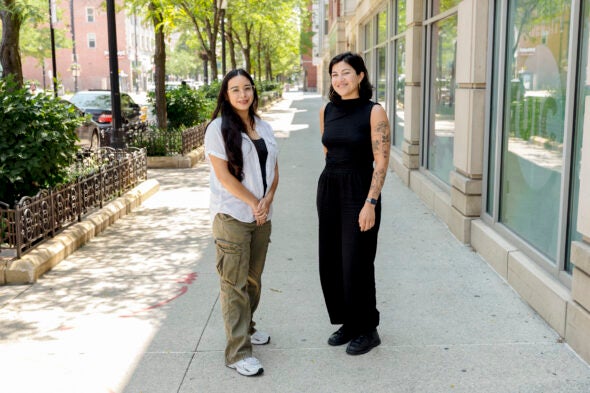Mellon Foundation extends Crossing Latinidades initiative with $5M grant

The University of Illinois Chicago-led initiative Crossing Latinidades will continue for another three years, thanks to a $5 million grant from the Andrew W. Mellon Foundation.
The research initiative supports Latino humanities faculty and doctoral students, and the extension to 2027 will focus on third- and fourth-year doctoral students as they develop their dissertation proposals on Latino humanities, including history, art and literature.
En español
The need for study focused on Latinos is evidenced by the rapid changes in U.S. demographics. Latinos make up 19% of the U.S. population. But, according to the National Science Foundation’s 2022 Survey of Earned Doctorates, only 8% of doctoral recipients were Hispanic/Latino U.S. citizens or permanent residents.
“Research shows that having diverse faculty is crucial to foster meaningful connections with students of color and from underrepresented populations,” UIC Chancellor Marie Lynn Miranda said. “Many universities describe and lament the pipeline problem for diverse faculty; UIC and our collaborators are working to solve it.”
UIC and the other 19 universities in the Alliance of Hispanic Serving Research Universities can choose two graduate students each year to participate in the program. The alliance is comprised of Hispanic-serving institutions with a Research 1 designation — top-tier doctoral universities with very high-level research activity, as measured by the Carnegie Classification of Institutions of Higher Education.
Crossing Latinidades is an essential anchor to enhance PhD completion. It leverages Research 1 Hispanic-serving institutions to be national leaders to increase the numbers of humanities doctoral students and faculty in the field of Latino, Latina and Latinx studies and to lead and support graduate scholarship and emerging areas of inquiry while developing a new cohort of scholars and future academics to advance the field. The program is open to all.
María de los Ángeles Torres, the principal investigator on the project, said the grant extension will allow the selected PhD students to work with advisors to prepare their dissertation proposals earlier than they could in previous years. The goal is to have students work to defend their dissertation proposal during their fellowship year, Torres said.
“This grows out of another program, which was a dissertation completion, and the one thing that students suggested is that they would have benefited a lot more had the program been in place when they were developing their proposal,” said Torres, university distinguished professor and professor of Latin American and Latino studies.
As part of the program, students are invited to UIC for a summer institute in Latino humanities study methodologies and theories, where they will get guidance from advisors, writing coaches and Latino humanities experts as they work on their dissertation proposals.
Students will then receive a fellowship to be research assistants to professors working on Latino humanities projects, preferably at their institution or another university in the alliance, Torres said.
The two UIC doctoral students are Marina Alvarez, who is pursuing a PhD in art history, and Briana Salas, who is pursuing a doctorate in history.
UIC’s Center for Latinx Literature of the Americas, headed by Daniel Borzutzky, associate professor of English and Latin American and Latino studies, will be involved in the project. Amalia Pallares, previously UIC’s vice chancellor for diversity, equity and engagement and now vice provost for inclusive excellence at Arizona State University, will continue with the initiative as a co-principal investigator.
Crossing Latinidades began in 2020 after UIC staff, including Torres and Pallares, outlined the need for a consortium of Research 1 and Hispanic-serving institutions to advance research on U.S. Latino culture and strengthen pathways for Latinos to become professors. The Mellon Foundation awarded UIC its first three-year, $5 million Latino humanities grant in 2021.
In addition to UIC, the alliance includes Arizona State University; the Graduate Center, CUNY; Florida International University; Texas Tech University; University of Arizona-Tucson; University of California system institutions of Irvine, Riverside, Santa Barbara and Santa Cruz; University of Central Florida; University of Colorado Denver; University of Houston; University of Nevada, Las Vegas; University of New Mexico; University of North Texas; and the University of Texas system institutions of Arlington, Austin, El Paso and San Antonio.

